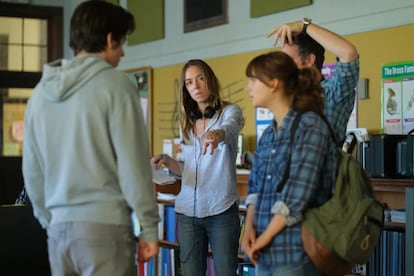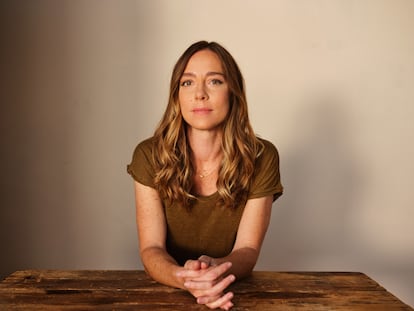‘CODA’: How a film about a deaf family made it to the Oscars and won
Director Sian Heder’s comedy was the surprise winner at the 2022 Academy Awards. In this interview with EL PAÍS, she talks about her casting decisions, the experience of making the movie and what she shares in common with her characters


When director Sian Heder got a call offering her a new project, she knew at once what her terms would be. Heder – who is better known for her work on television as a writer for Orange Is The New Black and as the creator of Little America, than for her 2016 feature film Tallulah (starring Elliot Page and Tammy Blanchard) – was offered the chance to adapt the French tragicomedy The Bélier Family (2014). This movie follows the story of a teenager with extraordinary singing abilities who is the only hearing person in a deaf family. The French version stars famous actors, such as Karin Viard and François Damiens, in the lead roles. The casting choices drew criticism, though, and Heder had one thing clear. “It was my one condition. The deaf characters would be played by deaf actors,” she recalls. “If not, I wouldn’t participate.”
And the movie has exceeded all expectations. On Sunday, CODA won three Oscars, including the Academy Award for Best Picture. Before the ceremony, Heder was excited the movie was nominated at all. “The Oscars thing is amazing, fantastic, right? A little crazy. I love the film with all my heart, but it’s a little small for the Oscars,” she explains to EL PAÍS, following the Sundance Film Festival, where it won the US Grand Jury Prize, US Dramatic Audience Award, and a Special Jury Ensemble Cast Award. Heder also won Best Director in the US Dramatic section.
The film’s title CODA is a play on words: it is the acronym for “children of deaf adults,” and also refers to an epilogue to a piece of music. “Originally the rights belonged to a big studio. But they didn’t see it clearly, and the producer [Philippe Rousselet] kept them, he called me, and I realized that I could use it to tell a very personal story,” Heder says. The 44-year-old also requested creative control of the script. In her version, the Béliers are the Rossis, a fishing family, who by law must take Ruby with them on fishing expeditions so that she can listen out for sound signals from other boats. “I moved them [from France] to the coast of my state, Massachusetts, which I know very well, and it reminded me of my parents’ origins,” she explains. Heder’s father is Hungarian and escaped his country as a child during the Second World War, while her mother is Welsh. “I grew up in a community, though in a way I didn’t 100 percent belong to it,” she explains, a sentiment she shares with Ruby. “There’s a direct parallel between the lives of children of deaf people, who experience different realities inside and outside of their homes, and that of children of first-generation immigrants,” Heder says. “My father didn’t understand some American customs, and of course, he was nothing like my friends’ fathers.”
In keeping with her promise to only cast deaf actors for the deaf characters, Marlee Matlin, who won the 1986 Oscar for Best Actress for Children of a Lesser God, was chosen to play the mother. Troy Kotsur, who won this year’s award for Best Supporting Actor, was cast as the father, and Daniel Durant as the son. All three are deaf. British actress Emilia Jones was cast as the lead, and she spent six months studying sign language. “Being a small production, they had to get really involved,” Heder insists. “They understood that it was an incredible opportunity, and I used the communication among their characters to explore something that interests me a lot: the use of language, the friction between people who don’t understand each other. You have to tell that with humor, so the audience normalizes the situation, so that when they leave the theater they see the deaf community differently.”

Following the movie’s triumph at Sundance, Apple TV acquired the distribution rights for $25 million, and signed a deal with Heder, giving her free rein to choose her next project. The director has already started working. Her next film will be about disability rights activist Judy Heumann, one of the most fascinating characters in the documentary Crip Camp, an Oscar nominee in 2021. “Heumann has fought for the rights of disabled people since a time when disabilities weren’t even recognized,” says Heder. “She’s even advised [former US] president Obama.” Will it be a film for the general public? “Like everything I do.” Does the label “feel-good movie” bother her? “Not at all. There’s nothing better than grabbing the audience with something that emerged in such a personal way.”
In Tallulah, Coda and in her television work, Heder returns to a central idea: what makes a family? How are emotional bonds created? “I’ve realized it with time. I’m drawn to dysfunctional families, to put a label on them. Human beings always need another human being nearby. Our spirit pushes us to create communities.” That same theme is also present Mother, the short film she took to Cannes in 2006 and which went on to inspire Tallulah. “In television, the same thing happens. I write solitary characters who seek affection.”
Tu suscripción se está usando en otro dispositivo
¿Quieres añadir otro usuario a tu suscripción?
Si continúas leyendo en este dispositivo, no se podrá leer en el otro.
FlechaTu suscripción se está usando en otro dispositivo y solo puedes acceder a EL PAÍS desde un dispositivo a la vez.
Si quieres compartir tu cuenta, cambia tu suscripción a la modalidad Premium, así podrás añadir otro usuario. Cada uno accederá con su propia cuenta de email, lo que os permitirá personalizar vuestra experiencia en EL PAÍS.
¿Tienes una suscripción de empresa? Accede aquí para contratar más cuentas.
En el caso de no saber quién está usando tu cuenta, te recomendamos cambiar tu contraseña aquí.
Si decides continuar compartiendo tu cuenta, este mensaje se mostrará en tu dispositivo y en el de la otra persona que está usando tu cuenta de forma indefinida, afectando a tu experiencia de lectura. Puedes consultar aquí los términos y condiciones de la suscripción digital.








































